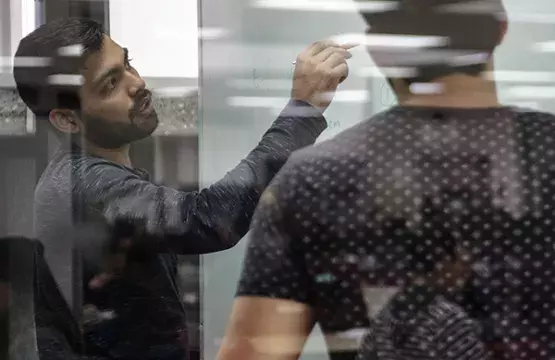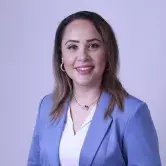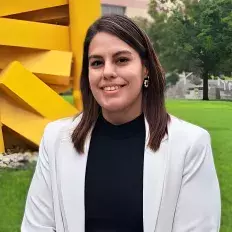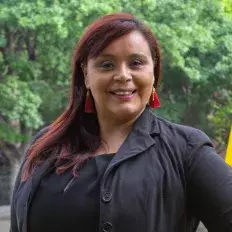Description
Our Master’s Degree in Organizational Development and Change (Online) (MDOC) trains you as a professional so that you can enable change and innovation processes in organizations, centered on individual and collective development, utilizing e-learning as a resource for learning and acquiring competencies.
We are part of the 5% of Business Schools worldwide that hold this accreditation.
Of our professors are members of the Sistema Nacional de Investigadores (SNI).
In the category Human Resources Management, within the Top 200 of Latin America, of the Eduniversal Best Masters Ranking 2019.
Objective
You will be educated and trained as a professional who can facilitate change and innovation processes, implementing techniques, models, and methodologies so that you can monitor the development of individuals, teams, and organizations to contribute to devise and implement the plan to improve the work atmosphere, the culture, as well as the human and administrative processes, in response to the challenges of national and international organizations.
Student Learning Outcomes
- You will collaborate as an agent of change, aligning business strategies with human capital and organizational development and proposing, in conjunction with the client, solutions in the short, medium and long term.
- You will analyze and diagnose different human and organizational processes in order to suggest and implement improvements in them.
- You will master the handling of diversity, a skill acquired by having made trips to visit other countries and multinational corporations, and by having developed projects of intervention in innovation and change processes in global organizations.
- You will develop the "I as an instrument of change" by growing in the skills of interaction, introspection and reflection on personal growth and that of others.

Admission profile
- Hold an undergraduate degree and have at least two years of post-graduation work experience.
- Be currently working.
- A positive attitude toward change, learning, and service.
- An ability to work in a team, with an inclination to human processes.
- Common sense and judgment, creative, and innovative.
- Committed to society, pragmatic, with logical, analytical thinking.
Graduate profile
Upon completion of this master’s degree, you will have developed the following knowledge:
- Theories of applied behavioral sciences.
- Culture, diversity, and organizational behavior.
- Group theory and dynamics.
- Leadership theories and approaches.
- Organizational communication theories.
- Creativity and innovation methodologies.
- Positive psychology theories.
- Theories of learning.
- Professional values and ethics.
- Theory of general systems.
- Theories of structure design and organization.
- Strategic planning and administration.
- Theories and models of organizational change.
- Diagnosis and organizational dialogic methodologies.
- Research and action-research methodologies.
- Intervention models and methodologies.

Upon completion of this master’s degree, you will have developed the following skills:
- You will devise interventions based on quantitative and qualitative diagnosis (dialogic).
- You will intervene in and facilitate processes at the level of individuals, groups, and organizations, oriented to enhance results.
- You will design, coordinate, and manage change projects.
- You will evaluate the results of change interventions.
- You will diagnose human, team, and organizational processes.
- You will facilitate learning processes.
- You will devise and facilitate group processes.
- You will develop others (training, tutoring, feedback).
- You will integrate human processes with strategy and operation.
- You will manage and lead change.
- You will integrate and manage diversity in organizations.
- You will model the ethics and value of Organizational Development.
- You will use Self as a help instrument.
- You will adopt and adapt change.

Upon completion of this master’s degree, you will have developed the following attitudes:
- Proactive.
- Collaborative.
- Service.
- Openness.
- Self-knowledge.
- Learning.
- Self-awareness.
- Helping relationship.

Live an experience abroad
Have an academic experience abroad for a summer, a semester or a year.
See moreCurriculum
Consult the courses that you will take in the Master’s Degree in Organizational Development and Change (Online).
*The order presented may change.
| Course | Credits |
|---|---|
| Integration of Learning Community | 6 |
| Organizational Theory and Structure | 6 |
| Consulting Process Initial Stages | 2 |
| Course | Credits |
|---|---|
| Introduction to Organizational Development | 6 |
| Systemic Approach to Change | 6 |
| Consulting Process Diagnosis | 2 |
| Course | Credits |
|---|---|
| Group Methodologies and Processes | 6 |
| Intervention Methodology | 6 |
| Consulting Process Intervention | 2 |
| Course | Credits |
|---|---|
| Leadership and Strategic Change | 6 |
| Practical Approaches to Strategic Management | 6 |
| Change Project Phase One | 3 |
| Course | Credits |
|---|---|
| International Cultural Perspectives | 6 |
| Organizational Culture and Diversity Management | 6 |
| Change Project Phase Two | 3 |
| Course | Credits |
|---|---|
| Closing of Learning Community | 6 |
| Trends in Organizational Development toward Sustainability | 6 |
| Change Project Phase Three | 2 |







